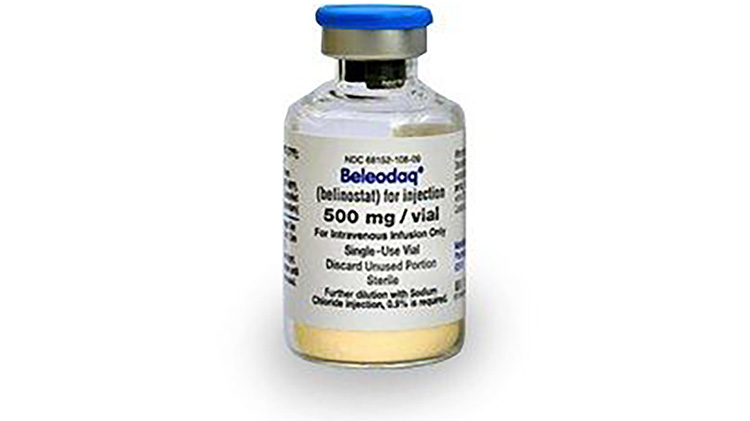Beleodaq (belinostat) vs Adcetris (brentuximab vedotin)
Beleodaq (belinostat) vs Adcetris (brentuximab vedotin)
Beleodaq (belinostat) and Adcetris (brentuximab vedotin) are both used to treat certain types of lymphoma, but they work in different ways and are approved for different indications. Beleodaq is a histone deacetylase inhibitor approved for the treatment of relapsed or refractory peripheral T-cell lymphoma, and it works by interfering with the expression of genes needed for cancer cell growth. On the other hand, Adcetris is an antibody-drug conjugate that targets CD30, a protein expressed on the surface of some lymphoma cells, and is approved for several indications, including Hodgkin lymphoma and systemic anaplastic large cell lymphoma, among others; it delivers a cytotoxic agent directly to the cancer cells. It is crucial for a patient to consult with their healthcare provider to determine the most appropriate treatment based on their specific type of lymphoma, the stage of the disease, previous treatments, and overall health.
Difference between Beleodaq and Adcetris
| Metric | Beleodaq (belinostat) | Adcetris (brentuximab vedotin) |
|---|---|---|
| Generic name | Belinostat | Brentuximab vedotin |
| Indications | Peripheral T-cell lymphoma | Hodgkin lymphoma, systemic anaplastic large cell lymphoma, primary cutaneous anaplastic large cell lymphoma, and certain types of mycosis fungoides |
| Mechanism of action | HDAC inhibitor | CD30-directed antibody-drug conjugate |
| Brand names | Beleodaq | Adcetris |
| Administrative route | Intravenous | Intravenous |
| Side effects | Nausea, vomiting, fatigue, pyrexia, anemia | Peripheral neuropathy, neutropenia, fatigue, nausea, fever, anemia, cough |
| Contraindications | Known hypersensitivity to belinostat or any of its components | Known hypersensitivity to brentuximab vedotin, its components, or to bleomycin |
| Drug class | Antineoplastic agent | Antineoplastic agent |
| Manufacturer | Spectrum Pharmaceuticals | Seattle Genetics |
Efficacy
Beleodaq (Belinostat) for the Treatment of Lymphoma
Beleodaq (belinostat) is a histone deacetylase inhibitor approved by the U.S. Food and Drug Administration (FDA) for the treatment of patients with relapsed or refractory peripheral T-cell lymphoma (PTCL). This is a diverse group of aggressive blood cancers that have a poor prognosis and limited treatment options. The efficacy of Beleodaq was evaluated in a multicenter, single-arm clinical trial that involved patients with relapsed or refractory PTCL. The results demonstrated an overall response rate (ORR) with some patients achieving partial or complete responses to the treatment. However, the duration of these responses varied, and the long-term benefits of Beleodaq for PTCL patients require further investigation.
Adcetris (Brentuximab Vedotin) for the Treatment of Lymphoma
Adcetris (brentuximab vedotin) is an antibody-drug conjugate that targets CD30, a protein expressed on the surface of some lymphoma cells. It is approved for several indications related to lymphoma, including the treatment of classical Hodgkin lymphoma and systemic anaplastic large cell lymphoma (ALCL), among others. In clinical trials, Adcetris has shown significant efficacy in inducing remission in patients with relapsed or refractory Hodgkin lymphoma, particularly when used as a second-line therapy post-autologous stem cell transplant. Additionally, Adcetris has been effective in the treatment of systemic ALCL, yielding high response rates and durable remissions in a substantial proportion of patients.
Comparative Efficacy in Lymphoma Treatment
When comparing the efficacy of Beleodaq and Adcetris, it is important to note that they are used to treat different subtypes of lymphoma and their efficacy is not directly comparable. Beleodaq is specifically indicated for PTCL, while Adcetris has a broader range of indications within the spectrum of CD30-expressing lymphomas. Both drugs have shown efficacy in their respective indications and represent important options in the management of these challenging conditions. The choice of treatment is based on the specific type of lymphoma, the stage of the disease, previous treatments, and the individual patient's health status.
Conclusion
In conclusion, both Beleodaq and Adcetris have demonstrated efficacy in the treatment of different types of lymphoma. Beleodaq offers a treatment option for patients with relapsed or refractory PTCL, while Adcetris has been shown to be effective in treating relapsed or refractory Hodgkin lymphoma and systemic ALCL, among other CD30-expressing lymphomas. The continued development and clinical evaluation of these drugs are crucial to improving outcomes for patients with these serious and often aggressive diseases.
Regulatory Agency Approvals
Beleodaq
-
Food and Drug Administration (FDA), USA

Adcetris
-
European Medical Agency (EMA), European Union

-
Food and Drug Administration (FDA), USA

-
Health Canada

-
Pharmaceuticals and Medical Devices Agency (PMDA), Japan

-
Therapeutic Goods Administration (TGA), Australia

-
NMPA (China)

Access Beleodaq or Adcetris today
If Beleodaq or Adcetris are not approved or available in your country (e.g. due to supply issues), you can access them via Everyone.org.
How it works

Make an enquiry
Choose the medicine you want to buy, answer a couple of questions, and upload your prescription to speed things up. We’ll get back to you within 24 hours.


Make an enquiry
Choose the medicine you want to buy, answer a couple of questions, and upload your prescription to speed things up. We’ll get back to you within 24 hours.


Breeze through the paperwork
We'll guide you through the required documents for importing unapproved medicine, ensuring you have all the necessary information.


Get a personalized quote
We’ll prepare a quote for you, including medicine costs and any shipping, administrative, or import fees that may apply.


Receive your medicine
Accept the quote and we’ll handle the rest - sourcing and safely delivering your medicine.

Some text on this page has been automatically generated. Speak to your physician before you start a new treatment or medication.
Let's talk
If you have any questions, call us or send us a message through WhatsApp or email:
Contact us




